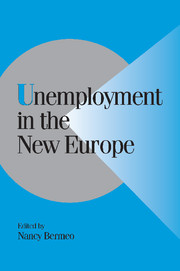Book contents
- Frontmatter
- Contents
- List of Contributors
- INTRODUCTION
- Part I Macroeconomic Contexts and Models
- Part II Unemployment and Domestic Bargaining Institutions: Challenging Some Myths
- Part III Unemployment and Domestic Bargaining Institutions: Three Cases
- 6 UNEMPLOYMENT AND TRADE UNION STRENGTH IN PORTUGAL
- 7 TRADE UNIONS, UNEMPLOYMENT, AND WORKING-CLASS FRAGMENTATION IN SPAIN
- 8 MODELL NEDERLAND: SOCIAL PARTNERSHIP AND COMPETITIVE CORPORATISM IN THE NETHERLANDS
- Part IV Unemployment, Voting, and Political Behavior
- Index
6 - UNEMPLOYMENT AND TRADE UNION STRENGTH IN PORTUGAL
Published online by Cambridge University Press: 26 March 2010
- Frontmatter
- Contents
- List of Contributors
- INTRODUCTION
- Part I Macroeconomic Contexts and Models
- Part II Unemployment and Domestic Bargaining Institutions: Challenging Some Myths
- Part III Unemployment and Domestic Bargaining Institutions: Three Cases
- 6 UNEMPLOYMENT AND TRADE UNION STRENGTH IN PORTUGAL
- 7 TRADE UNIONS, UNEMPLOYMENT, AND WORKING-CLASS FRAGMENTATION IN SPAIN
- 8 MODELL NEDERLAND: SOCIAL PARTNERSHIP AND COMPETITIVE CORPORATISM IN THE NETHERLANDS
- Part IV Unemployment, Voting, and Political Behavior
- Index
Summary
The impact of economic “crisis” and unemployment upon unions became a concern following the oil shocks of the 1970s (see Armingeon et al. 1981; Martin and Ross 1984; Mouriaux 1986). The present interest in the relationship between unemployment and unions in Europe follows an additional series of short-term economic cycles throughout which unemployment has continually increased, reaching unprecedented levels, and union strength has correspondingly – though not universally – tended to decline.
Union decline has been associated with factors such as the continuously changing composition of the labor force with the decline of industry in relation to services and feminization, rapid technological change displacing traditional manual worker union strongholds, shifts in the international division of industrial labor and industrial restructuring, changes in employer strategies and management practices and changes in the role of the state. Finally, it has also been emphasized that in numerous national cultures the values of workers were changing and attitudes toward unions were thus also changing to their disfavor. In the 1990s the consequences of such changes and mounting economic competition had a snowball effect upon employment, and attention has been increasingly drawn to structurally grounded and long-term unemployment as further impediments to future union development.
It is normal to suppose that union strength is dependent upon the conditions of the labor market. Indeed, this generally remains a good rule of thumb – at least with regard to economic downturn and growing unemployment. Very few workers are sufficiently insulated from economic insecurity by legal guarantees, institutional immunity, or labor market advantage for high unemployment not to have a depressing effect upon their willingness for collective action.
- Type
- Chapter
- Information
- Unemployment in the New Europe , pp. 173 - 202Publisher: Cambridge University PressPrint publication year: 2001
- 3
- Cited by



